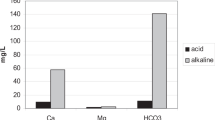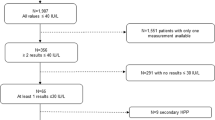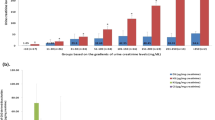Abstract
FOR the long-term treatment of chronic polyarthritis and collagenosis with hydroxychloroquinsulphate (HS) and hydroxychloroquindiphosphate (HP), accurate adjustment to a definite blood-level would be desirable. Unfortunately, at the present time, there are no specific methods of quantitative determination which can be used by the clinician for both substances. We therefore endeavoured to achieve satisfactory detection of HS and HP by paper chromatography and arrived at the following technique of investigation.
This is a preview of subscription content, access via your institution
Access options
Subscribe to this journal
Receive 51 print issues and online access
$199.00 per year
only $3.90 per issue
Buy this article
- Purchase on Springer Link
- Instant access to full article PDF
Prices may be subject to local taxes which are calculated during checkout
Similar content being viewed by others
Author information
Authors and Affiliations
Rights and permissions
About this article
Cite this article
MÜTING, D. Detection and Metabolism of Hydroxychloroquinsulphate and Hydroxychloroquindiphosphate in Human Beings. Nature 195, 1003–1004 (1962). https://doi.org/10.1038/1951003b0
Issue Date:
DOI: https://doi.org/10.1038/1951003b0
Comments
By submitting a comment you agree to abide by our Terms and Community Guidelines. If you find something abusive or that does not comply with our terms or guidelines please flag it as inappropriate.



